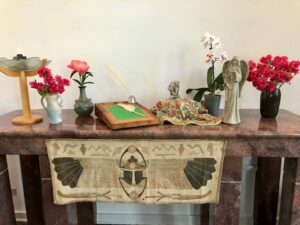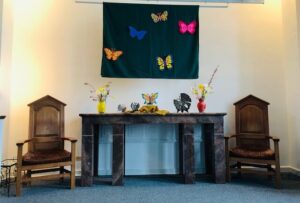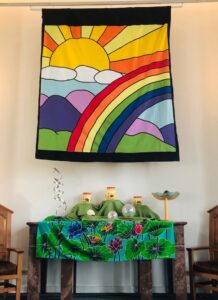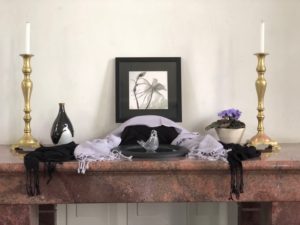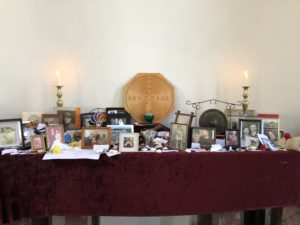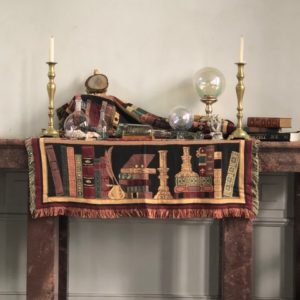Everything
Turns,
Rotates,
Spins,
Circles,
Loops,
Pulsates,
Resonates,
And
Repeats.
Circles
Of life,
Born from
Pulses
Of light,
Vibrate
To
Breathe,
While
Spiraling
Outwards
For
Infinity
Through
The lens
Of time,
And into
A sea
Of stars
And
Lucid
Dreams.
That was Suzy Kassem poem, “Circle of Life.”
The Autumnal Equinox was this past Thursday. It’s one of the markers of one of those turnings — the turning of the seasons: spring into summer, summer into fall, fall into winter, and winter into spring again. The cycle of these seasons has continued, unabated, since the earth tipped 23 1/2 degrees off its central axis about five hundred and seventy million years ago. “Everything turns, rotates, spins, circles, loops, pulsates, resonates, and repeats.”
Most of us are at least slightly tilted off our axis, too. We, too, go through cycles and seasons. Ours are not as measured and consistent as the earth’s, of course. Roughly speaking, it always takes 24 hours to pass from day through night, and 365 days (give or take) to cycle through the seasons, whereas for us a season might last days, or decades.
When I was a kid, the singer-songwriter Harry Chapin was telling us that all his life’s a circle, and we nodded and sang along:
All my life’s circle / sunrise and sundown/ the moon rolls through the nighttime / till the daybreak comes around. All my life’s a circle / but I can’t tell you why. /Seasons spinning round again/ the years keep rollin’ by.
That sounds kind of right, doesn’t it? Except that it’s not. Not exactly. A circle is too neat. Too ordered and orderly. We don’t mark the same circuit days after day, year after year — coming back to the same places we were before, covering the self-same ground to get there. We live our lives not in ever-repeating circles, but in spiraling cycles. We come back to some of the same places, sure, but coming back to them again we find that they’re ever so slightly, and sometimes quite drastically, different because, hopefully, we’re different. Because over the course of our last trip around our own internal sun we’ve changed. Grown. Become someone new. When Thomas Wolfe said, “You can’t go home again,” he didn’t mean that you couldn’t literally, physically return to the place you grew up in, but that if you do you’ll find that it’s no longer quite the same “home” it was, nor are you the same “you.”
And yet …
My brother Paul went to a lecture by the Buddhist teacher Jack Kornfield. At one point Kornfield asked, “Do you ever look in the mirror and, seeing the face that’s looking back at you think, ‘that’s not me’?” Paul, who had just passed one of those “milestone” birthdays had to say he knew the feeling. So do I. Maybe you do too. “Well,” Kornfield continued, “that’s because it’s not.” Despite all the outer changes that lead our kids and grandkids to look at pictures of us when we were there age and say, “Really?”, something stays the same within us. Something remains unchanging through all of those outer changes … and all the inner ones, too.
Those inner changes are what I was thinking about when I said that most of us were slightly titled on our axes. We may start off spinning straight and smooth, but we don’t stay that way for that long. All throughout our lives we experience things that knock us for a loop, knock us off our feet, knock us off our axis. Heartaches, failures, illnesses, deaths, the “thousand and one slings and arrows that flesh is heir to.” Yet it’s not just the hard stuff, either, that throws us for a loop. There’s a reason people say to “be careful what you wish for.” Those great things, too — finding that the love of your life loves you, too; aceing that test, that course, that degree; getting the job you’d hoped for; marriage; babies — all these things tilt our worlds. And we wobble ’till we find a way to establish some sense of stability in this new position. We don’t, any of us, come round and round again to the same place, at the same time, in the say way. Spiraling cycles, not static circles — that’s the reality of our lives.
And yet, through it all, something remains consistent — something, some one. There’s an “I,” a “me,” that moves in and through all of those changes. Even when I look back over my life and see how differently I thought, felt, and behaved in the past, it’s still “me” who’s noticing the ways I’ve changed. This “me” is who is looking out at the face in the mirror, thinking that the image isn’t me.
When French philosopher Rene Descartes wanted to get to the very bottom, the bedrock reality of what is knowable, he peeled away layer after layer of things we think we “know,” yet which we really only guess or assume. I “know” that I’m standing behind this pulpit, speaking to all of you, yet I might actually be lying in my bed, and you all might be characters in a dream. There’s no way, really, to know for sure. Piece by piece Descartes took apart the edifice of our certainty. Yet just before he came to the conclusion that there was nothing we could actually claim to know, no reality that we could count on as more than a mere perception, he realized that someone was thinking all these things. He couldn’t know for sure what he looked like, how old he was, where he lived, who he loved, but it was self evident that someone was thinking, and that, whatever else might or might not be true of him, he could know for certain that he was, as he put it, “a thinking thing.” Cogito ergo sum. I think, therefore I am.
Many, maybe even most of us probably don’t feel comfortable with such a reductionist idea that our essential existence is as “thinking things.” Yet the idea that there is an “essential existence,” a “core reality,” an “I,” a “me,” that moves through this life I know as mine — that probably seems to us self evident. Yet what is that thing? Who is, what is, that “I,” that “me” who’s asking these things? Who is, what is, that “I” who’s listening and thinking your own thoughts about all of this?
These are important questions, because when our axes are titled in ways we’re not yet used to or prepared for, we need to know where to go to find our center. When we’re buffeted about by the winds of change, we need to know what we can hang on to. For some of us, of course, the answer would be “God,” yet that’s really not much of an answer because “God” is just a word, a poetic shorthand, and using it doesn’t really tell us all that much about whatever it is we think we’re referring to when we use it. So the question of what, precisely, is our center, our anchor, our grounding point remains an open one.
A few days ago I noticed a full-page ad in Entertainment Weekly for a book called The Forgetting, by Sharon Cameron. The ad was nothing more than an image of the book’s cover, and the words, “What isn’t written, isn’t remembered. Even your crimes.” Who wouldn’t be intrigued? It’s the story of a young woman named Nadia, who lives in the city of Canaan, where every twelve years every person completely loses every one of their memories. All of them. After “the forgetting,” as its called, people don’t know their names, don’t recognize their families, can’t remember a single thing from the moment of waking up. So everyone has a book with them at all times, and everyone dutifully writes down everything about their lives, so that when they awake from the forgetting they can remind themselves of what they’ve forgotten. And over and again they are reminded of these words from what’s called “the First Book of the Forgetting:”
“At the first sun rising of the twelfth year, they will forget. They will lose their memories, and without their memories, they are lost. Their books will be their memories, their written past selves. They will write in their books. They will keep their books. They will write the truth, and the books will tell them who they have been. If a book is lost, then so are they Lost. I am made of my memories. Without memories, they are nothing.”
Can you imagine? No memories of who you are that are older than 12 years ago? You may know, the way we know facts from a text book, that this person is your spouse, and these people are your parents, and this stranger you’re looking at is your best friend, but you don’t actually remember them, not directly, not for more than the past twelve years.
Some of us come uncomfortably, painfully close. Anyone who’s had any association with Alzheimers or other forms of dementia know well what it’s like for someone to lose their memories of who they’ve been and become “lost.” Yet the situation in Canaan is different, I think, because during those twelve years you are completely lucid, living your life forming new vivid and vibrant memories … which you know you will forget in no more than twelve years. The people of Canaan live stuck in a repeating cycle, and are aware of both the reality of their situation and the limits that confine them.
For the people of Canaan, they live just as you and I do, but they have no “I” that has traveled with them throughout their lives, no touchstone for when the axis gets tilted. There’s nothing to hold on to. Except, their book.
Everyone carries their book with them at all times — tied to them, in fact. They know that their books are, in that great phrase, “their written past selves” and that “the books will tell them who they have been.” Even in this strange world, people need that. Need something consistent amidst all the inevitable challenges and changes of life. Need a sense of identity that can tell them who they’ve been, who they are, and who they might be. For the people of Canaan, who have no connection with their past, their books provide them with a “written past self” that helps them navigate the present and points them toward a future.
What is that identity for you? What is it that you hold on to when your feet are swept out from under you? Who is the “you” who looks out at the face the the mirror?
What gives the plot of The Forgetting its push is Nadia, because she, for some reason, didn’t forget during the forgetting. She remembers. And remembering, she wants to understand why things are the way they are, and how — if — they could be made right. While the book is written for ages 12 and up, I have to say that I had a hard time putting it down, and really wish it hadn’t come to an end. The plot twists felt completely real, and were completely unexpected. It was, as my mom hated to hear people say, “a good read.”
What would be in your book? Who is the “you” you come back to, the “you” who is you, the “you” you can count on when you can’t count on anything else. What, for you, precedes “ergo sum” — you … what … therefore you are? Our Unitarian Universalist faith doesn’t give us the answers to these questions. It does tell us that they’re important to ask.
There is a danger in what we’ve been thinking about this morning, that I feel I have to address. We can get too attached to our anchors, hold too tightly to those things that ground us, limit ourselves by being too bound by what we’ve been. It is all too easy to say “this got me through the last axial tilt, so I’d better not let of of it. Even a little.” We can become almost superstitious about it, like the athlete who insists on wearing the same socks to every game because he was wearing them that time they won. We can use this sense of “who I’ve been, and who I am” to fix ourselves in place. Yet are not meant to be fixed in place. We are meant to be in orbit — moving, turning, rotating, spinning, circling, looping, pulsating, resonating, and, yes, repeating, yet never quite exactly in the same way.
The author of The Forgetting address all of this too, having her heroine write in her book near the end,
“We are made of memories. I’ve read those words every day of my life. Today I decided that they’re true. We are who we have been. But it’s my choice today that is the memory of tomorrow. It’s my choice that determines what I will become. Not the memories of the past.”
We live our lives not in ever-repeating circles, but in spiraling cycles. We come back to same of the same places, to be sure, but coming back to them again we find that they’re ever so slightly, and sometimes quite drastically, different because, hopefully, we’re different. Because over the course of our last trip around our own internal sun we’ve changed. Grown. Become someone new.
May it be so for us all.


